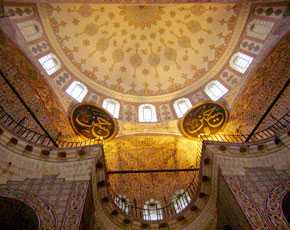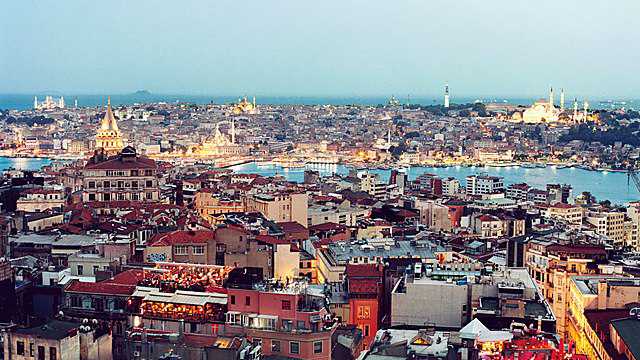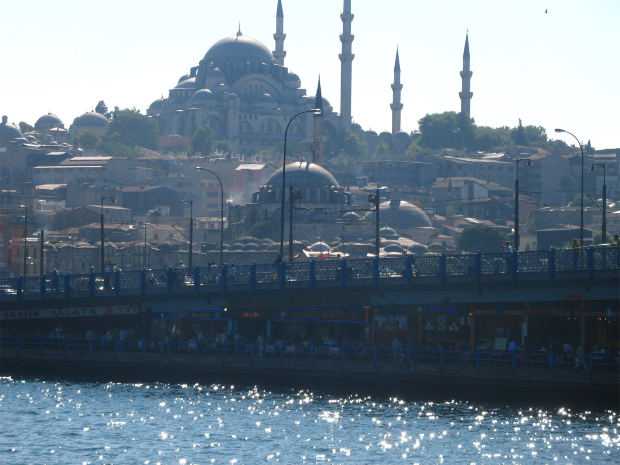Despite the problems of the ruble and the weak oil price in recent months for the Russian economy, the Russian Government is pursuing a very active foreign policy strategy. Its elements focus on countering the continuing NATO encirclement policy of Washington, with often clever diplomatic initiatives on its Eurasian periphery. Taking advantage of the cool relations between Washington and longtime NATO ally, Turkey, Moscow has now invited Turkish President Abdullah Gul to a four day state visit to discuss a wide array of economic and political cooperation issues.
In addition to opening to Turkey, a vital transit route for natural gas to western Europe, Russia is also working to firm an economic space with Belarus and other former Soviet republics to firm its alliances. Moscow delivered a major blow to the US military encirclement strategy in Central Asia when it succeeded earlier this month in convincing Kyrgystan, with the help of major financial aid, to cancel US military airbase rights at Manas, a major blow to US escalation plans in Afghanistan.
In short, Moscow is demonstrating it is far from out of the new Great Game for influence over Eurasia.
Warmer Turkish relations
The Government of Prime Minister Recep Erdogan has shown increasing impatience with not only Washington policies in the Middle East, but also the refusal of the European Union to seriously consider Turkey’s bid to join the EU. In the situation, it’s natural that Turkey would seek some counterweight to what had been since the Cold War overwhelming US influence in Turkish politics. Russia’s Putin and Medvedev have no problem opening such a dialogue, much to Washington’s dismay.
Turkish President Abdullah Gul paid a four-day visit to the Russian Federation from February 12 to 15, where he met with Russian president Dmitry Medvedev, Prime Minister Vladimir Putin, and also travelled to Kazan, the capital of Tatarstan, where he discussed joint investments. Gul was accompanied by his state minister responsible for foreign trade, and Minister of Energy, as well as a large delegation of Turkish businessmen. Foreign Minister Ali Babacan joined the delegation.
Visit to Tatarstan
The fact that Gul’s Moscow visit also included a stop in Tatarstan, the largest autonomous republic in Russian Federation whose population mainly consists of Muslim Tatar Turks, is a sign how much relations between Ankara and Moscow have improved in recent months as Turkey has cooled to Washington foreign policy. In previous years, Moscow was convinced that Turkey was trying to establish Pan-Turanism in the Caucasus and Central Asia and inside the Russian Federation, a huge concern in Moscow. Today clearly Turkish relations with Turk entities inside the Russian Federation are not considered suspicious as it was once, confirming a new mood of mutual trust.
Russia elevated Gul’s trip from the previously announced status of an ‘official visit’ to a ‘state visit,’ the highest level of state protocol, indicating the value Moscow now attaches to Turkey. Gul and Medvedev signed a joint declaration announcing their commitment to deepening mutual friendship and multi-dimensional cooperation. The declaration mirrors a previous ‘Joint Declaration on the Intensification of Friendship and Multidimensional Partnership,’ signed during a 2004 visit by then-President Putin.
Turkish-Russian economic ties have greatly expanded over the past decade, with trade volume reaching $32 billion in 2008, making Russia Turkey’s number one partner. Given this background, bilateral economic ties were a major item on Gul’s agenda and both leaders expressed their satisfaction with the growing commerce between their countries.
Cooperation in energy is the major area. Turkey’s gas and oil imports from Russia account for most of the trade volume. Russian press reports indicate that the two sides are interested in improving cooperation in energy transportation lines carrying Russian gas to European markets through Turkey, the project known as Blue Stream-2. Previously Ankara had been cool to the proposal. The recent completion of the Russian Blue Stream gas pipeline under Black Sea increased Turkey’s dependence on Russian natural gas from 66 percent up to 80 percent. Furthermore, Russia is beginning to see Turkey as a transit country for its energy resources rather than simply an export market, the significance of Blue Stream 2.
Russia is also eager to play a major part in Turkey’s attempts to diversify its energy sources. A Russian-led consortium won the tender for the construction of Turkey’s first nuclear plant recently, but as the price offered for electricity was above world prices, the future of the project, awaiting parliamentary approval, remains unclear. Prior to Gul’s Moscow trip, the Russian consortium submitted a revised offer, reducing the price by 30 percent. If this revision is found legal under the tender rules, the positive mood during Gul’s trip may indicate the Turkish government is ready to give the go-ahead for the project.
Russia’s market also plays a major role for Turkish overseas investments and exports. Russia is one of the main customers for Turkish construction firms and a major destination for Turkish exports. Similarly, millions of Russian tourists bring significant revenues to Turkey every year.
Importantly, Turkey and Russia may start to use the Turkish lira and the Russian ruble in foreign trade, which could increase Turkish exports to Russia, as well as weakening dependence on dollar mediation.
Post-Cold War tensions reduced
However the main message of Gul’s visit was the fact of the development of stronger political ties between the two. Both leaders repeated the position that, as the two major powers in the area, cooperation between Russia and Turkey was essential to regional peace and stability. That marked a dramatic change from the early 1990’s after the collapse of the Soviet Union when Washington encouraged Ankara to move into historically Ottoman regions of the former Soviet Union to counter Russia’s influence.
In the 1990’s in sharp contrast to the tranquillity of the Cold War era, talk of regional rivalries, revived ‘Great Games’ in Eurasia, confrontations in the Caucasus and Central Asia were common. Turkey was becoming once more Russia’s natural geopolitical rival as in the 19th Century. Turkey’s quasi-alliance with Ukraine, Azerbaijan, and Georgia until recently led Moscow to view Turkey as a formidable rival. The regional military balance developed in favor of Turkey in Black Sea and the Southern Caucasus. After the disintegration of the USSR, the Black Sea became a de facto ‘NATO lake.’ As Russia and Ukraine argued over the division of the Black Sea fleet and status of Sevastopol, the Black Sea became an area for NATO’S Partnership for Peace exercises.
By contrast, at the end of the latest Moscow visit, Gul declared, ‘Russia and Turkey are neighboring countries that are developing their relations on the basis of mutual confidence. I hope this visit will in turn give a new character to our relations.’ Russia praised Turkey’s diplomatic initiatives in the region.
Medvedev commended Turkey’s actions during the Russian-Georgian war last summer and Turkey’s subsequent proposal for the establishment of a Caucasus Stability and Cooperation Platform (CSCP). The Russian President said the Georgia crisis had shown their ability to deal with such problems on their own without the involvement of outside powers, meaning Washington. Turkey had proposed the CSCP, bypassing Washington and not seeking transatlantic consensus on Russia. Since then, Turkey has indicated its intent to follow a more independent foreign policy.
The Russian aim is to use its economic resources to counter the growing NATO encirclement, made severe by the Washington decision to place missile and radar bases in Poland and the Czech Republic aimed at Moscow. To date the Obama Administration has indicated it will continue the Bush ‘missile defense’ policy. Washington also just agreed to place US Patriot missiles in Poland, clearly not aimed at Germany, but at Russia.
Following Gul’s visit, some press in Turkey described Turkish-Russian relations as a ‘strategic partnership,’ a label traditionally used for Turkish-American relations. Following Gül’s visit, Medyedev will go to Turkey to follow up the issues with concrete cooperation proposals. The Turkish-Russian cooperation is a further indication of how the once overwhelming US influence in Eurasia has been eroded by the events of recent US foreign policy in the region.
Washington is waking up to find it confronted with Sir Halford Mackinder’s ‘worst nightmare.’ Mackinder, the ‘father’ of 20th Century British geopolitics, stressed the importance of Britain (and after 1945 USA) preventing strategic cooperation among the great powers of Eurasia.
F. William Engdahl is author of A Century of War: Anglo-American Oil Politics and the New World Order (Pluto Press) and Seeds of Destruction: The Hidden Agenda of Genetic Manipulation (www.globalresearch.ca ). His new book, Full Spectrum Dominance: Totalitarian Democracy in the New World Order (Third Millennium Press) is doe for release in late Spring 2009. He may be reached via his website: www.engdahl.oilgeopolitics.net .






